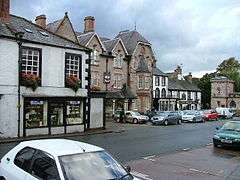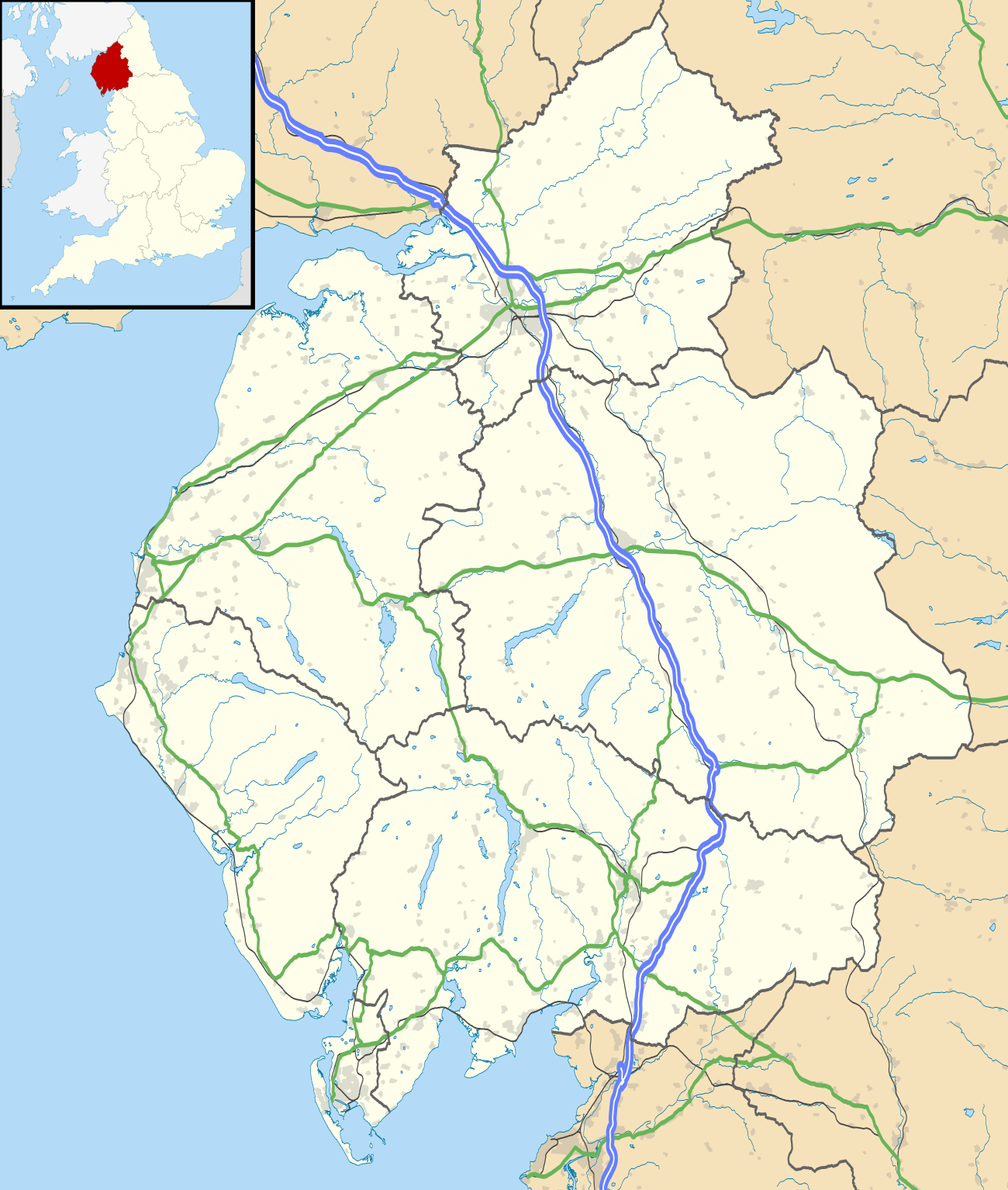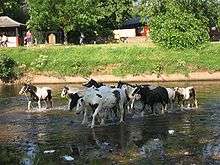Appleby-in-Westmorland
| Appleby-in-Westmorland | |
|---|---|
 Boroughgate | |
 Appleby-in-Westmorland Appleby-in-Westmorland shown within Cumbria | |
| Population | 3,048 (2011) |
| OS grid reference | NY6820 |
| Civil parish |
|
| District | |
| Shire county | |
| Region | |
| Country | England |
| Sovereign state | United Kingdom |
| Post town | APPLEBY-IN-WESTMORLAND |
| Postcode district | CA16 |
| Dialling code | 017683 |
| Police | Cumbria |
| Fire | Cumbria |
| Ambulance | North West |
| EU Parliament | North West England |
| UK Parliament | |
| Website | http://applebytown.org.uk/ |
Appleby-in-Westmorland is a market town and civil parish in the Eden district, in the county of Cumbria, in North West England. It is situated within a loop of the River Eden. In 2011 the parish had a population of 3,048.[1] It is in the historic county of Westmorland, of which it is the traditional county town.
The town's name was simply Appleby, until the local government changes of 1974. When a successor parish was formed for the former borough of Appleby, the council effected a change in the town's name, to preserve the historic county's name.[2]
History
St Lawrence's Church is the parish church. It is recorded in the National Heritage List for England as a designated Grade I listed building.[3] Appleby Castle was founded by Ranulf le Meschin at the beginning of the 12th century. It was placed under siege during the Second English Civil War, during which Thomas Harrison was wounded.[4]
Economy

Appleby is overlooked by the (privately owned) Appleby Castle, a predominantly Norman structure, which provided the home for Lady Anne Clifford in the 17th century. Appleby's main industry is tourism, due to its history, remote location, scenery and closeness to the Lake District, the North Pennines, Swaledale and Howgill Fells.
Events
The annual Appleby Horse Fair, a four day weekend event, is held in the first week of June. It brings about 10000 Gypsies and Irish Travellers and typically 30000 others from all over Britain. The earliest record of the fair, a charter from Henry II, is from the 12th century but it is believed to have a longer tradition[5]. Appleby Agricultural Society, established in 1841[6], hosts the annual Appleby Agricultural Show. More recently the town has held an annual themed carnival. Other events in and around Appleby can be found on the town's community website[7].
Governance
Appleby was a parliamentary borough, electing two Members of Parliament, from medieval times. By the 18th century it had become a pocket borough, the nomination of its MPs effectively being in the gift of the Lowther family. Its representatives included William Pitt the Younger, who was MP for Appleby when he became Prime Minister in 1783 (although he stood down at the following general election when he was instead elected for Cambridge University).
A later member for Appleby was Viscount Howick, subsequently (as Earl Grey) the Prime Minister whose administration passed the Great Reform Act of 1832; but Grey's history as a former MP for the town did not save it from losing both its members under the Act. As the only county town to be disfranchised, Appleby was one of the more controversial cases in the debates on the reform bill, the opposition making unsuccessful attempts to amend the bill so as to save at least one of its MPs. The town was granted a new charter in 1885. [8]
The town remained a municipal borough until this status was abolished under the Local Government Act 1972, and was superseded by Eden district, based in Penrith. Although having the status of a municipal borough, it was a lot smaller in size and population than most urban districts in the country. It had, however, a larger population than some early Westmorland urban districts including Grasmere and Shap.
Although Appleby was the county town of Westmorland, the former county council sat in Kendal, even though the Assize Courts were in Appleby.
Transport
Appleby railway station is on the Settle-Carlisle Line and was opened by the Midland Railway in 1876. Appleby East station, built by the North Eastern Railway was nearby; it closed in 1962 but retains the potential for connection to the Eden Valley Railway.
Notable People
- Thomas Barlow (1607/8–1691) — an English academic and clergyman who became Provost of Queen's College, Oxford and Bishop of Lincoln was born at nearby Orton and attended Appleby Grammar School.
- Lady Anne Clifford played a major part in shaping Appleby restoring the castle and refurbishing the town's churches. Her memorial stands beside that of her mother in St Lawrence's Church in Boroughgate, where both are buried.
- George Washington's father and two half brothers were educated at Appleby Grammar School. He was to have followed in their footsteps, but in 1743, on reaching the age at which the two older boys had made the long voyage from Virginia, his father died suddenly. George Washington was not to make the Atlantic crossing, nor to acquire the classical education that schools like Appleby excelled at.
- Helen Skelton and her brother Gavin Skelton attended Appleby Grammar School.
See also
References
- ↑ "Parish population 2011". Retrieved 19 June 2015.
- ↑ https://www.independent.co.uk/voices/comment/eric-pickless-championing-of-traditional-english-counties-is-something-we-can-all-get-behind-8568394.html
- ↑ Historic England. "Parish Church of St Lawrence, Appleby-in-Westmorland (1312067)". National Heritage List for England. Retrieved 24 June 2012.
- ↑ Maurice Ashley (1954), Cromwell's Generals, London: Cape, OCLC 798976
- ↑ http://www.applebyfair.org
- ↑ de Silva, Carrie (2013). "A Short History of Agricultural Education and Research". Newport, Shropshire, UK.: Harper Adams University.
- ↑ "What's On Appleby".
- ↑ "Appleby" in Chambers's Encyclopædia. London: George Newnes, 1961, Vol. 1, p. 491.
External links
| Wikimedia Commons has media related to Appleby-in-Westmorland. |
| Wikivoyage has a travel guide for Appleby-in-Westmorland. |
| Wikisource has the text of the 1911 Encyclopædia Britannica article Appleby. |
- Cumbria County History Trust: Appleby (nb: provisional research only - see Talk page)
- Appleby-in-Westmorland Society's picture archive updated daily
- Town Council and Tourist Information Centre